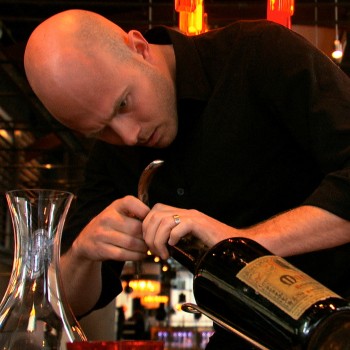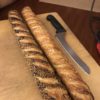It takes a great deal more than a taste for wine to become a certified Master Sommelier. Filmmaker Jason Wise follows the process of preparing for the insanely difficult examination required to earn that title in his new documentary SOMM (in select theaters, and on iTunes).
The idea came about when he saw a group of young would-be sommeliers tasting wine silently and wanted to set it to music. But making the film taught him about the seriousness and non-BS-ness of becoming a true “wine surgeon.”  Rico Gagliano: What attracted you to the subject of the Sommelier test?
Rico Gagliano: What attracted you to the subject of the Sommelier test?
Jason Wise: Well, I graduated film school and did what I think all proper film majors do is you immediately bar tend. We used to drink wine in somebody’s garage until probably four in the morning every Saturday when we all got off. All these servers and bartenders would go to a friends garage.
In the process of this a friend of mine who worked at Morton’s Steakhouse named Brian who said, “I’m taking this exam. You should come in and take a look at it.” I walked in and watched them blind taste and it just absolutely floored me. I’d never seen anything like this in my life.
It felt kind of like watching a ballet with no music. I wanted to set music to this tasting thing so badly.
Rico Gagliano: Maybe this would be a good time to explain to people who haven’t seen the movie what this test really consists of. Obviously, blind tasting of wines is one aspect.
Jason Wise: This organization has this top test that makes you a master Sommelier. This level has three parts, three days, one each day. You can only take this test once a year so it is incredible build up and so tense when you finally get to this thing.
The first part you take is theory, where they ask you about 100 or so questions. They rapid-fire throw them at you. It’s not written. Anything about wine since the beginning of time all the way to the present – wine laws, wine history, from chemistry, from viticulture, from you name it – that could be on that test. So that is just incessant studying.
Then you have service which is ten tables or so that are like mock people you could see in a restaurant.
Rico Gagliano: It’s like a fake restaurant they set up basically?
Jason Wise: Like a fake restaurant. At one table they’re like I’ve got 195 guests coming for my daughter’s bat mitzvah and everyone likes Italian wines and so we want you to pair all of these Italian wines. The next table it’s like the queen of England and she’s really pissed off, that kind of thing. They have that for the service portion.
Then the last part is my favorite portion, which is the tasting. That’s when you have three whites and three red glasses of wine in front of you and you have no idea what they are other than the color. You have to break them down and show your work and identify the varietal, the region it’s from, the vintage, whether it’s a good or a bad wine, what kind of quality it is. It is so incredibly difficult.
The tasting portion, when I first started this, I think I carried into it what a lot of people have that you think there’s an element of BS when people smell and taste wine and they say leather. You go yeah, okay, I’m sure there’s leather in there.
Rico Gagliano: One of the gentlemen says that something smells like “a freshly-opened bottle of tennis balls.”
Jason Wise: Yes, well if you’ve ever opened tennis balls you know that smell. It is a synthetic rubber smell that is like nothing else. If you smell clear valley Riesling I promise you, you may not smell tennis balls but you will smell rubber on there and they say new pool toy, they say all sorts of different things to represent that.
When I started this I thought there was an element of BS. Watching them do this deductive tasting where they’re trying to figure out what the wine isn’t versus what it is, it made me realize this is not BS.
Rico Gagliano: What is the value of being able to do that though I guess would be the question.
Jason Wise: I think I’ll play devils advocate here. Does somebody need to identify an Israeli wine to be able to sell you a wine? Do they have to know everything about the wine regions of Bulgaria to sell you a glass of wine? No. But I look at it this way, when people saw this film they say “it’s not like they’re brain surgeons or it’s not like they’re Navy Seals. Why do they need such a hard test?”
You know what I thought about it?
When I come from work I want a glass of wine and I want a good one. I don’t need a brain surgeon. I need a glass of wine.
Rico Gagliano: Most days you need a glass of wine not a brain surgeon.
Jason Wise: Right. So in my opinion I look at it also this way; Let’s say I’m at dinner with somebody that might be my future wife and this has got to be a great evening. It’s got to be perfect for a million reasons and there’s a million variables. I want a brain surgeon to help me with my wine.
Rico Gagliano: Let me ask you one last question before we let you go. I’m assuming that you’ve absorbed a lot of information during the making of this film. If you had to give our listeners a really cheap excellent wine that maybe they could pop while they’re listening to our show, what wine pairs well with public radio?
Jason Wise: What wine? The biggest thing I learned from this film is you don’t have to spend more than $15 or $16 on an amazing bottle of wine. That’s what I learned making this. You know, it’s tough. I can give you regions like southern Italy, like Sicilian red wines.
Rico Gagliano: That’s good for public radio? Why?
Jason Wise: Because they’re cheap and they’re delicious. I don’t know if that’s good for public radio. I think it’s just good for anybody that doesn’t want to waste money.


